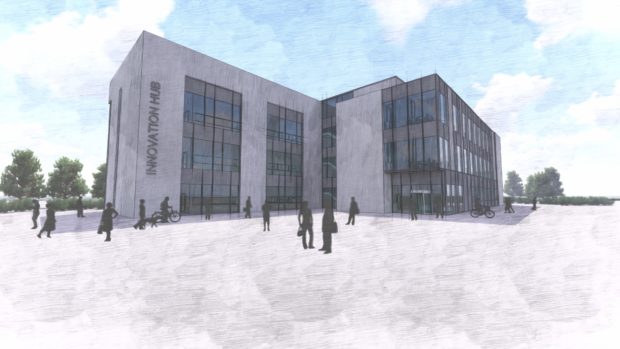A new Dundee University project is poised to create a multi-million pound boost for the local economy — but hinges on the Tay Cities Deal being signed off.
The proposed Tay Cities Biomedical Cluster, led by the university in partnership with NHS Tayside, will house life science companies, creating around 250 new jobs by 2033.
Economists Value People have forecast the region will benefit in excess of £175 million in that time.
It is hoped the facility can help stop the city “haemorrhaging” companies.
The funding for the project is courtesy of the Tay Cities Deal, but the university is still waiting on the final sign off to unlock funds for the £25 million project.
The final sign off has been in limbo since the UK general election last year delayed proceedings.
Professor Mike Ferguson, one of the leads for the project, said: “If the deal was signed off tomorrow, the earliest we could reasonably expect to have the facility complete should be by November 2022.
“For every year there is a delay in bringing this to the city, we are going to lose at least one company.”
Mr Ferguson says every year staff at the university see the seeds of an innovative company as students carry out research, but the lack of facilities in Dundee sees them leave to set up elsewhere in the world once they have completed their course.
Some examples of this are Exscientia — a pharmatech company who have remained a presence in Dundee, but now have about half their workforce in Oxford and Osaka — and Amphista Therapeutics, who are now based in Motherwell.
Mr Ferguson added: “The problem is we are losing them in the because there is nowhere to go.
“They then end up all over the world, with a lot going to Boston.
“We’re hoping to stop that haemorrhaging of jobs.”
Central to the project is an innovation hub close to the university’s School of Life Sciences at Dundee Technopole.
A medical device research and development facility will also be developed in the School of Medicine and within NHS Tayside as part of the project.
Mr Ferguson, who is a regius professor of Life Sciences at the university, said: “We have a fantastic opportunity to build on the considerable strengths we have established in life sciences research and medical technology for the benefit of the Tay cities region.
“We have already seen new companies established from our discoveries and expertise, notably Exscientia, which has become a world leader in using artificial intelligence to design new medicines.
“The project will catalyse on… accelerating company formation, company growth and delivering new jobs for the region and a sizeable economic boost.”
Professor Graeme Houston, professor of clinical imaging and intervention, leads medical devices research and is director of the Biomedical Cluster.
He said: “This investment offers excellent facilities for translation of research from scientists and the NHS clinicians to develop new treatments for patients.”
A UK Government spokesman said the Tay Cities Deal will be signed off “as soon as possible”.










